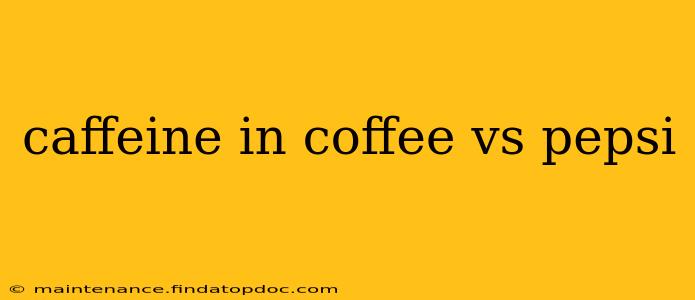Caffeine is a stimulant found in many beverages, including coffee and Pepsi. While both provide a caffeine kick, the experience and effects differ significantly due to variations in caffeine content, other ingredients, and the overall impact on the body. This article delves into the specifics, comparing caffeine levels, effects, and potential health implications of consuming coffee versus Pepsi.
How Much Caffeine is in Coffee vs. Pepsi?
This is a crucial starting point. The caffeine content in coffee varies dramatically depending on the type of bean, brewing method, and the size of the serving. Generally, an 8-ounce cup of brewed coffee contains between 80-100mg of caffeine, although this can range from as low as 40mg to over 200mg. Espresso typically contains more caffeine per ounce.
Pepsi, on the other hand, contains a significantly smaller amount of caffeine. A 12-ounce can of Pepsi typically contains around 35-45mg of caffeine. This means you would need to drink several cans of Pepsi to consume the same amount of caffeine found in a single cup of coffee.
What are the Effects of Caffeine from Coffee and Pepsi?
Both coffee and Pepsi's caffeine can provide a temporary boost in energy, alertness, and focus. However, the effects extend beyond just the caffeine.
Coffee, besides caffeine, contains various other compounds, including antioxidants, which contribute to its overall effect on the body. Many people report experiencing a more sustained energy boost from coffee, along with a feeling of improved concentration and mood. However, excessive coffee consumption can lead to anxiety, jitters, and insomnia.
Pepsi, being a carbonated soft drink, contains sugar and artificial sweeteners, alongside its caffeine content. The combination of sugar and caffeine can lead to a rapid energy surge followed by a crash, leaving you feeling lethargic and potentially irritable. The added sugar also contributes to health concerns like weight gain and dental problems, which are less associated directly with coffee consumption.
Is Caffeine from Coffee Healthier than Caffeine from Pepsi?
While both coffee and Pepsi contain caffeine, the overall impact on health differs significantly. Coffee, especially in moderation, has been linked to several potential health benefits, including improved brain function, reduced risk of type 2 diabetes, and protection against certain diseases. These benefits are largely attributed to the presence of antioxidants and other bioactive compounds in coffee beans, not just the caffeine itself.
Pepsi, due to its high sugar and artificial sweetener content, lacks these health benefits and is associated with a range of potential health risks. Regular consumption of sugary drinks is linked to obesity, heart disease, and other chronic conditions. Therefore, the caffeine in coffee is generally considered a healthier source of caffeine than the caffeine in Pepsi.
Does Caffeine from Coffee and Pepsi Have Different Effects on Sleep?
Both coffee and Pepsi's caffeine can interfere with sleep if consumed too close to bedtime. The caffeine's stimulating effects can make it difficult to fall asleep and may result in less restful sleep. However, the duration of these effects can vary depending on individual metabolism and the amount of caffeine consumed. The added sugar in Pepsi might also contribute to sleep disturbances in some individuals.
Is Caffeine from Coffee More Addictive Than Caffeine from Pepsi?
While caffeine can be habit-forming for some individuals, there's no definitive evidence suggesting caffeine from coffee is inherently more addictive than caffeine from Pepsi. The degree of dependence is largely determined by individual factors such as metabolism, consumption habits, and genetic predisposition.
How Much Caffeine is Too Much?
The recommended daily intake of caffeine varies depending on individual factors, but generally, it is advised to limit caffeine intake to under 400mg per day. Exceeding this limit can lead to adverse effects such as anxiety, insomnia, rapid heartbeat, and digestive issues. Remember that this limit encompasses all sources of caffeine, not just coffee or Pepsi.
This comparison highlights that while both coffee and Pepsi contain caffeine, their overall impact on health and well-being varies considerably due to the presence of additional ingredients and the different ways caffeine interacts with the body. Choosing coffee over Pepsi is generally a healthier choice, provided it's consumed in moderation.
